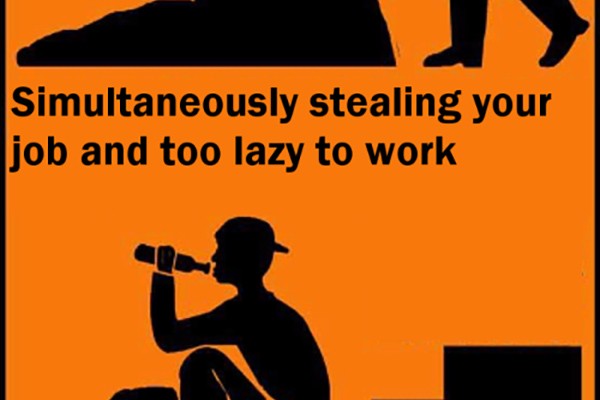An Australian politician doesn’t usually become immigration minister all at once.
Generally, the portfolio takes some time to work its evil magic on new appointments. Think of the slow desiccation of Liberal moderate Philip Ruddock, transformed, over a period of years, into an animated cadaver clutching an Amnesty badge in its withered claws. Think of the Labor Party’s Tony Burke, mumbling Rudd’s Manus Island talking points on The 7.30 Report with all the enthusiasm of Bukharin at the Moscow Trials.
Peter Dutton, however, has taken to the ministry like a fish to water. Or, rather, like a pig to mud, given his snout-first dive into the dirt this morning.
‘They won’t be numerate or literate in their own language, let alone English,’ Dutton told Sky News. ‘These people would be taking Australian jobs, there’s no question about that.’
To date, the so-called ‘refugee debate’ in Australia hasn’t often involved such a direct discussion of jobs. That’s because ‘border protection’ generally functions as a proxy for other issues.
The polls show that most voters don’t care very much about refugees.
They don’t care about them in the sense that they’re not moved by humanitarian rhetoric (45 per cent of voters want the refugees on Manus Island to stay there, even after the PNG High Court declared the facility illegal). But they also don’t care in the sense of not being particularly invested in the subject.
Last year, when Essential Media polled voters on the issues most important to them, ‘treatment of asylum seekers’ came in at the eleventh place, nominated only by eight per cent of respondents. The highest ranked issues were: ‘management of the economy’ (47%), ‘Australia’s health system’ (46%), and ‘jobs and protection of local industries’ (39%).
When Enoch Powell delivered his famous ‘rivers of blood’ anti-immigration speech in Britain in 1968, he was backed by a significant mobilisation of unionists, with a thousand dockworkers marching to Westminster to support him.
Nothing similar is happening here. During the leaders’ debate at Sky’s so-called People Forum, the attendees repeatedly asked about house prices and the behaviour of the banks. None mentioned immigration.
That’s the reason for Dutton’s new intervention.
For politicians, as I’ve argued elsewhere, the refugee issue serves as a substitution for good governance, with ‘controlling the borders’ a metaphor for ‘controlling the country’. It’s much, much easier to talk tough about asylum seekers than to deliver economic growth, reform the health system or create jobs. In that sense, border control is the perfect political issue, lending itself perfectly to macho posturing and media stunts.
Certainly, the Liberals would much prefer to talk about boat arrivals than, say, tax reform or inequality. By referring to jobs, Dutton’s trying to whistle-up an anti-immigration populism, in order to undercut the ‘top hats versus hard hat’ narrative that’s begun to dominate the election.
Obviously, he’s also trying to exploit the divisions within the ALP over offshore detention. Almost every second day, a fresh Labor candidate gets exposed as having once been committed to decent treatment for refugees, an offence that necessitates an immediate public recantation.
Bill Shorten has now, quite correctly, compared Dutton’s comments to the rhetoric of Pauline Hanson. But you can see how, once again, the Labor Party’s managed to wedge itself.
For if refugees do take jobs, what’s wrong with Dutton saying so? Alternatively, if Dutton’s wrong – if they don’t take jobs – why’s the ALP so determined not to allow refugees to come to Australia?
As it happens, there’s a robust literature out there about the effects of immigration. Last year, Peter Martin, the economics editor at the Age, published a piece arguing that the effects of increased immigration in Australia was comparable to the mining boom.
‘The case for opening our borders,’ he wrote, ‘as part of a staged process, in concert with other countries, is extraordinarily strong.’
Now, you can argue about Martin’s formulations. But, given the centrality of border protection to Australian politics over the last decades, it’s striking how rarely arguments like that (which are commonplace within the academic literature) get articulated within the public domain.
It should be noted that Dutton’s efforts to drag the campaign down the low road present dangers for the Liberals just as much as they do for Labor. Border control remains, after all, indelibly associated with Tony Abbott (you may have heard how he ‘stopped the boats’), a man whose political ghost continues to gibber within the Liberal Party. If Turnbull now goes full Abbott, voters may well wonder as to the point of the leadership change. If it doesn’t – if the PM distances himself from Dutton – the gesture will fuel the hostility of those Liberals activists who currently regard Turnbull as a slightly upmarket version of Bill Shorten.
Anti-refugee sentiment is generally seen as a winning strategy for the conservatives. But that’s not necessarily the case. Much depends on whether the Left’s capable of articulating an alternative.






